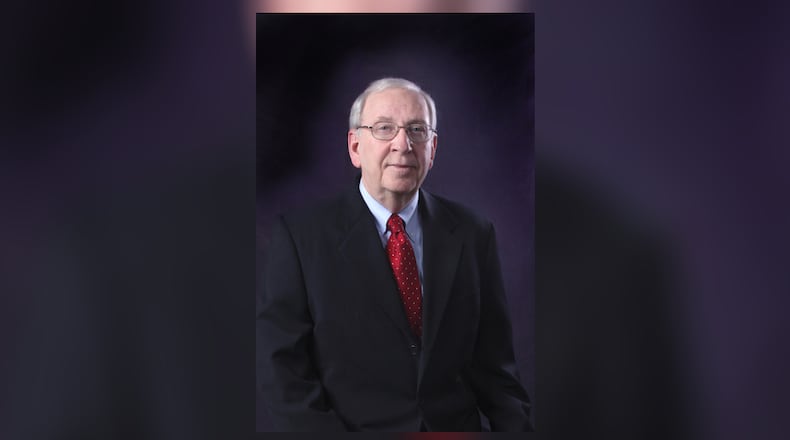Suddenly, tracer rounds struck the ground between him and the soldier to his right. The rounds had to be coming from behind Bill, which meant the entire platoon was now surrounded. Bill raised up and turned to see if he could spot the enemy machine gun and return fire.
As Bill turned, he was struck by two blows to his back. He began gasping for air, his lungs were gurgling and he had intense pain in his chest. Bill knew he had a sucking chest wound; the bullets had penetrated a lung.
The only platoon medic had been killed trying to save the lives of other men in the platoon by leap frogging from position to position. A Black soldier lying nearby saw Bill struggling for each breath. The soldier went to Bill’s aid, tore the plastic wrapper off of a field dressing and placed it over the gaping holes in Bill’s back and wrapped it with the long sleeves of the dressing. No medevac now.
Bill Palmer was from Dayton, Ohio. He went to Northmont High, where he ran the 100-yard dash and high hurdles. When he graduated from Northmont in 1964, he went to work at GM Inland Division on the assembly line, and started night school at the University of Dayton. There was no money for college, so he worked while he went to school. In October of 1965, he got his draft notice and reported with two buddies from Dayton, and the three of them went to Army Basic Training at Fort Knox and then Infantry AIT at Fort Ord. Graduation from AIT meant he was 11Bravo, Infantry - the Queen of Battle. They all volunteered for airborne school at Fort Benning and only Bill passed the rugged, physically challenging four-week course.
Bill was sent to Vietnam as a replacement in the 173rd Airborne Brigade. The 173rd was Westmoreland’s fire brigade in Vietnam. It was arguably one of the best-trained units in Vietnam, with high morale and a reputation for race relations so good it was known as “Two Shades of Soul.”
On the day he was shot, Bill was assigned to A Company, 3rd Platoon, 3rd Squad. The company had about 170 soldiers that day when it began a very dangerous movement in the triple canopy jungle. The Battalion commander insisted that the company begin a search-and-destroy operation with the three-line platoons separated by a thousand yards, making mutual support in the jungle in an emergency almost impossible.
When contact was made with hundreds of VC, Bill’s platoon had 42 soldiers. Staff Sgt. Charles Morris, Bill’s squad leader, a veteran of the Korean War, took command despite having been shot in the chest. He was wounded five times that day. Morris stayed on his feet, moving around in the ever-shrinking perimeter. On at least two occasions, the VC tried to overrun the position and Morris rallied the many wounded and a few non-wounded to repel the assaults.
Five hours later, when the relief force found the platoon and Morris, he was lying on his back with grenade pins stacked on both thumbs. A lieutenant kicked his boot to make sure he was dead and Morris’ eyes opened. As the lieutenant bent over, Morris reached up and grabbed his collar and told him: “Make sure all my people get out. Don’t leave anyone behind.”
Bill Palmer drifted in and out of consciousness and continued to return fire. At the end, he had a .45 automatic pistol with only five rounds left as everyone else ran out of ammo. He was finally medevacked by an Air Force helicopter lowering a stretcher into the jungle. After treatment at a MASH unit, he was evacuated to Saigon and then on to Osaka, Japan. Bill had been shot by a .30 MG. He had lost the lower lobe of his right lung. The surgeons told him that the bullets had probably been slowed by something before hitting him and crushing his right ribs. The soldier who put the plastic wrap on him had saved his life.
They sent Bill back to Vietnam. After his tour was up, he went to Fort Bragg, where he was discharged in 1967, and returned to Dayton and his job at GM.
Bill enrolled in night school at UD and decided he wanted to follow his dream of flying. The VA gave him a 40% disability, and he had VA educational benefits. He was advised against flight school by the VA because of the severity of his injuries and so enrolled in the University of Dayton, where got his engineering degree in 1975. He continued his work at GM and pioneered the use of polymers and was sent to Germany, Mexico and Portugal. Bill met his wife Joy on a blind date in 1968, and they married in1970. They have two children and four grandchildren.
Eventually, Bill started his own company, Palmer Plastics, making auto parts. Bill Palmer has employed hundreds of people in Dayton and generated millions of dollars for the local economy.
The VA finally gave Bill a 70% disability rating in 2021. He has more surgery scheduled on his neck — something about jumping out of airplanes at 1,500 feet.
Of the 42 men of the 3rd Platoon, only 13 were not killed or wounded that day. Sgt. Morris was awarded the Medal of Honor.
Bill survived what most of us will never endure and only read about. Like his fellow grunts that day, he never gave up. That experience is embedded in him; it is part of his character and the mettle of the man. He would not change what happened to him that day, and those blue eyes get moist when he remembers all those heroes who gave everything that day.
David Madden is a retired trial attorney, was an Army Platoon Leader, JAG LTC and a spokesperson for the ACLU.
About the Author

